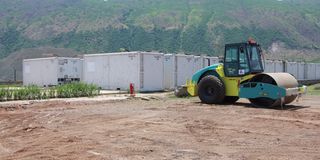Prime
How Russia-Ukraine war is impacting oil projects

What you need to know:
- Whereas the business environment has been constrained by the Russia-Ukraine conflict, the Petroleum Authority of Uganda says the impact will mostly be experienced on the supply side than on prices because many of its procurement contracts are long term.
Total Energies general manager, Phillipe Groueix’ ‘slight’ comment on the impact of Russia- Ukraine war on Uganda’s oil project did not send shock to the oil sector, but a message had been sent.
During the April oil and gas convention in Kampala, Phillipe commented thus: “The Ukraine – Russia war that nobody could have expected to that extent, and even if we are not affected directly, I would say, you can see that all the raw material prices are skyrocketing,” he said, noting the conflict was creating uncertainty.
However, Phillipe noted the project would be delivered by 2025 and “it is up to us to see how we can mitigate this difficult situation”.
As predicted, the impact of the Russia – Ukraine conflict is already taking a direct aim across a number of oil and gas projects in Africa, especially where Russian oil companies are actively involved.
However, for Uganda’s case, the Lake Albert oil development project might face an indirect impact in obtaining key raw materials such as steel and aluminum at affordable prices.
In an analysis published in March during the early stages of the conflict by BS Stainless, a steel supplier in UK, indicated that the West’s response with sanctions had already impacted global financial markets, blocking supply chains and leading to dramatic increase in price of various commodities.
The disruption meant that suppliers has to add on projected costs, adjust to a longer delivery time and even possible absence of proposals for some tenders.
According to BS Stainless, Russia currently produces around 6 percent of the world’s aluminum and around 10 percent of nickel. The country is also the world’s fourth-largest producer and third-largest exporter of steel.
By April, both aluminum and nickel had hit record prices, hovering around £2,897 per tonne and £21,817 per tonne, respectively.
The sanctions imposed on Russia, according to the steel company, will impact prices for many reasons, including deferrals in shipment, delays in establishment of alternative sources and payment delays, among other factors.
Steel prices are expected to rise sharply in Europe, as sanctions lead to further shortages in a market already facing shortages in supply.
“The demand for semi-finished steel is predicted to increase, pushing export prices higher and impacting domestic steel prices,” BS Stainless said, indicating: “It may take several months until the entire supply chain can be reinstated.
Even more, costs of insurance and freight are also likely to rise, resulting in further increase in metal prices.
An official in the oil sector, who requested anonymity, noted that the war had changed “a lot of things” largely impacting steel and aluminum products, causing postponements to predict any price fluctuations.
But even then, the official noted, the changes had not critically impacted project planning.
Tom Ayebare Rukundo, the Petroleum Authority of Uganda economic and financial analysis manager, said oil projects were first impacted by Covid-19 and now the slowdown in the global economy.
However, he said, unlike the slowdown, Covid-19 provided oil companies in Uganda to lock in lower prices from suppliers because there was no business going on around the world.
“Those who actually wanted to get some business done had more bargaining power, so you could arm twist, or negotiate harder,” Rukundo says.
However, the Russia – Ukraine war has twisted the story.
For instance, Rukundo says: “If you have locked in some prices, yet you want to get steel from Russia and now there are sanctions on the parent company, contractors are then forced to look for another steel mill which may be slightly expensive.”
The position, he says, remains fluid with some impact expected within the year and notes that whereas there might be some increments, the prices locked in contracts were much lower.
Locking in prices is subject to conditions that companies have signed for an agreed price unless an action is beyond the control of the two parties.
“We locked in contracts that were good and much lower in prices with a 50 – 40 percent lower than what we estimated, we do not see a material impact on the projects in Uganda,” he says.
The conversation for now, according to Rukundo, is not to double or triple what we had actually quoted in the contracts, but the discussion centers on what kind of help or agreement to meet some of those costs.
The impact is also being felt by contractors as fuel prices keep surging.
The Russia- Ukraine war has escalated oil prices with Brent crude now standing at $115 per barrel, according to oilprice.com.
Brent crude is the leading global price benchmark for Atlantic basin crude oils and is used to set the price of two-thirds of the world’s internationally traded crude oil supplies. “At this point, we cannot speculate to what kind of extent, but we have been made aware some service providers who had signed contracts earlier are experiencing some challenges and the simple one is that even the price of fuel around the world has gone up,” Rukundo says.
Impacted
Joseph Mukasa, the Pearl Engineering chief executive, notes that fuel price escalation has already impacted their operations.
Pearl is a tier two company undertaking construction of the Tangi Operation Support Base camp for oil activities in Murchison Falls Park.
“When we were bidding, fuel prices were at Shs3,000, but right now, they are at Shs6,200 yet the contracts are fixed. The situation is crazy, and we may request for changes soon from the Petroleum Authority of Uganda,” Mukasa said during a presentation at the recent annual national content conference in Kampala.




